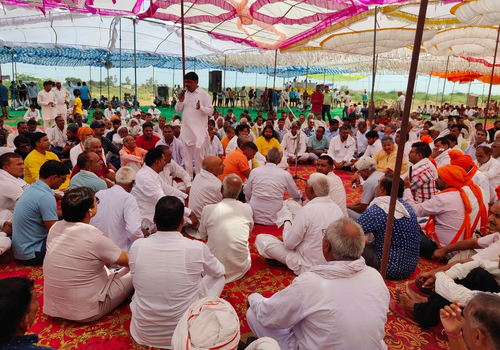Speakers at a mahapanchayat held at Palwal openly threatened to “cut off hands” of everyone who would raise their hands, despite a police-imposed “no hate speech condition.” During the meet, it was decided to take out the Jalabhishek Yatra once again in Nuh on August 28, writes Mohd Naushad Khan
Even after the Nuh violence that erupted on July 31, hooligans are continuing their hatemongering. Speakers at a mahapanchayat held at Palwal openly threatened to “cut off hands” of everyone who would raise their hands, despite a police-imposed “no hate speech condition.” During the meet, it was decided to take out the Jalabhishek Yatra once again in Nuh on August 28, and the release of all innocent people who were implicated in cases was also demanded. Hate speeches in various parts of the country despite the Supreme Court order put a serious question mark on the implementation of the court order.
Earlier, the ongoing economic boycott against Muslims in the violence-hit areas of Nuh and Gurugram drew a strong reaction from the Supreme Court on August 10, calling it “unacceptable.” At the same time, the Court also recommended to create a committee under Director General of Police (DGP) to look into instances related to the communal unrest. Greater emphasis was placed on the importance of fostering unity and understanding between both the communities.
On August 17, Delhi High Court Women Lawyers Forum asked Chief Justice of India D Y Chandrachud to direct the government of Haryana to prevent incidents of hate speech and ban such videos that create an atmosphere of fear. In a letter petition signed by 101 women lawyers, they sought a direction to the Haryana government to track and ban videos that threatened to harm any community or places of worship or urge economic boycott. In their plea, they also sought direction to the state government to take immediate action against persons found responsible for committing acts of hate speech.
At regular intervals, controversy is purposefully created to instil fear psychosis in the minds of minorities, particularly Muslims with divisive narratives. The Supreme Court order on hate speech was widely welcomed but there are many questions which require further explanation: Can the SC order be implemented when there is political patronage to hate speech? Will all States and Union Territories take steps to implement it in their respective states? Who will be accountable if there is any defiance of the SC order? Will the State remain neutral and transparent in its identification of hatemongers or will it go down through communal prism as we usually see victims being made accused?
Undisputedly, the menace of hate speech has long plagued India’s sociopolitical and legal systems and confronts both constitutional scheme of secularism and pluralism pacification. It is the hate speech that poisons young minds and instigates them to attack minorities and their places of worship.
In the past, the court issued a number of preventive orders to forbid religious gatherings and rallies where hate speech was likely to be delivered. For example, on February 3, 2023, the court ordered the Maharashtra government to make sure that no hate speech is delivered at the February 5 rally. The administration was likewise asked to document the rally and submit it to the court.
On hate speeches during and after the Nuh violence, senior Supreme Court lawyer Sanjay Hegde said, “The Supreme Court orders on hate speech are rendered meaningless if not followed in letter and spirit. If police forces do not honour SC order, register suo-motu FIRs and make necessary arrests, the orders will be of no consequence. In each instance it may not be possible for SC to take up contempt proceedings for non-implementation. High Courts must step up and seek explanations from the police authorities and if necessary require the launching of disciplinary proceedings against relevant policemen for non-compliance.”
On the implementation of SC order on hate speech and the role of police, Praveen Rai who is a Political Analyst at the Centre for the Study of Developing Societies (CSDS), Delhi said, “The SC directed the police to register suo motu FIR against hate speeches without waiting for a formal complaint and any delay in doing so would amount to contempt of the apex court. The failure of the police and intelligence agencies in taking cognizance of hate speeches in online public spaces that led to violence in Nuh revealed limitations of the court’s order.”
Mr. Rai further said:
“The police force neither has the legal intelligence nor modern law enforcement training to differentiate between ‘hate and freedom of speech’. As a result, they mostly fail in taking pre-emptive measures to prevent violence based on religious intolerance.
“It does not put in fetters on media which knowingly or unknowingly propagates highly offensive discourse targeting religious groups nor fixes any reasonable restrictions on social media platforms that make them viral and results in sectarian conflicts. A more practical way to handle and control religious strife would be to direct the judiciary at district level to take suo motu cognizance of hate speech and lay down protocols for media to refrain from amplifying them for political manipulation and creating social animosity. Any hesitancy or delay by the lower judiciary and law enforcement agencies in initiating action or any gross violation by the media would amount to contempt of the highest court would have a more deterring effect than the existing SC guidelines.”
Experts believe that if SC order on hate speech is not implemented in letter and spirit then hate speech may become a new normal one day which would be detrimental not only to the society but also to the country at large.




